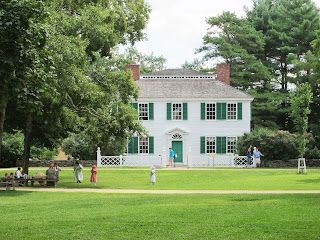There's a place in Massachusetts called Old Sturbridge Village. It's a recreation of an early nineteenth century New England town composed of actual buildings from the period. Interpreters staff the park helping visitors to understand what life was like in the antebellum North. This is the world that produced Alcott, Emerson, Thoreau, Poe, Whitman, Melville, Bulfinch, and Hawthorne. It's a pattern of life that's left its ghost all over the New England countryside. Take a look at how many towns have at their old center the village green with its Congregational church at one end and its Episcopal church at the other complete with burial ground. The old colonial architecture still holds sway in the building plans of the houses, those that don't simply date from the colonial period, that is. Sure, the downtown will be a glorious hodgepodge of Victorian brick, but get away from the old train tracks and the ghosts of the old mills and you'll see it.
My family used to love going to Old Sturbridge Village. Mom and Dad were eager to go on our last little trip and we were happy to oblige. Below, you can see a few snapshots of this special place. Places form people. No matter how rough the Yankee exterior may be, this is what is at its heart.
My family used to love going to Old Sturbridge Village. Mom and Dad were eager to go on our last little trip and we were happy to oblige. Below, you can see a few snapshots of this special place. Places form people. No matter how rough the Yankee exterior may be, this is what is at its heart.













Comments